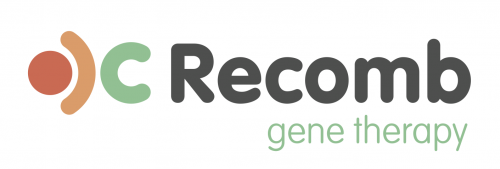Current status
Currently there is an unmet medical need for the most common type of SCID, RAG-SCID. The only available treatment is the allogeneic stem cell transplantation (HSCT) with:
- Low survival in mismatched HSCT recipients;
- Possibilities to develop graft vs. host disease.
Safer therapies are needed such as a gene therapy-based approach.
Expected influence
RECOMB is designed to provide a curative treatment based on gene therapy using autologous HSCs, which will:
- Increase survival;
- Eliminate the possibility of graft vs. host disease.
High level of safety and efficacy has been shown in similar gene therapies for ADA-SCID and SCID-X1.
Current status
Predictable significant increase in the number of RAG-SCID patients on the horizon of new born screening for SCID.
Expected influence
The RECOMB program will make gene therapy a realistic option for ~70% of all SCID patients
Current status
Current healthcare for SCID and other severe forms of PID is orientated around HSCT as the definitive treatment option
Expected influence
Gene therapy will change the healthcare model for these rare diseases and will require a new set of infrastructures with specially trained personnel both at a technical and clinical level, and lead to the establishment of new regulatory standards and guidelines. This is expected not only for SCID, but for several other diseases treated by gene-modified autologous HSCs. The number of patients per year (for these diseases combined) may then increase to several hundreds or thousands annually. A new model including highly specialized centres with the expertise to receive, transduce and return cells to remote clinical units elsewhere in the EU, will likely become a global standard.
Current status
The current practice of allogenic transplantation can be expensive.
Expected influence
Gene therapy for RAG-SCID will significantly reduce healthcare costs for the treatment of this condition, and potentially many others (similar to ADA-SCID and X-linked SCID therapies). The short term economic impact of the new infrastructure needed will be an increase in the costs but in long term and with national SCID NBS programmes being implemented widely, the impact will be a reduction of health care costs for treating the growing number of SCID patients.
Current status
Due to complications of treatment or organ damage due to delayed treatment, some SCID patients will not be able to contribute actively to society.
Expected influence
Patients treated with gene therapy will be able to live normal lives, contribute actively to the society and economy..
The RECOMB programme will create new business opportunities for existing companies, pharmaceutical and particularly SMEs that specialise in gene therapy‒based products and newly established enterprises.
Current status
HSCT is currently the only available treatment for SCID and has low survival rates for patients without a matched donor and possibility to develop graft vs. host disease.
Expected influence
Through RECOMB and gene therapy, SCID patients will have an increased chance of survival with no risk of graft vs. host disease.
Current status
HSC transplantation centres might be distantly located from patients’ residence, and their treatment requires travel of the patient, together with their families. The patient or the family might also need to pay for lodging during the treatment.
Expected influence
RECOMB is a multinational, multicentre clinical trial with several major transplantation centres. During the therapy cells - and not patients - will travel to the transduction site, and genetically modified stem cells will be returned to the participating clinical centres and transplanted to the patients. Thus, providing wide access to this novel treatment for all affected children throughout Europe. This setting is more viable practically (and financially), if gene therapy is to become standard treatment of choice.
Current status
With current treatment, the patient must go through a lot of conditioning before HSCT transplantation, which is often uncomfortable and inconvenient for the patient.
Expected influence
For some types of gene therapy, low-dose or no conditioning is sufficient, making the treatment more comfortable for patients.
Current status
Insufficient engagement of patients in research, and difficulties in finding information about medical conditions, treatment options and current developments on the field.
Expected influence
Patients’ needs are reflected in RECOMB and they are actively involved due to the participation of The International Patient Organisation for Primary Immunodeficiencies (IPOPI). It guarantees improving awareness, access to early diagnosis and optimal treatments for primary immunodeficiency (PID) patients worldwide as well.
Current status
Though Europe is the global leader in developing stem cell-based gene therapy due to SCID programs granted by EU calls,> 50% of SCID patients do not have gene therapy as treatment option.
Expected influence
RECOMB building on these projects will reinforce this leading role by delivering treatment for addional patients without a possibility for gene therapy.
Current status
Industry investements in research and development of medicinal products to treat rare diseases (orphan diseases) such as SCID are beginning to happen.
Expected influence
RECOMB program and EU share similar objectives to advance the development of orphan medicinal products. The project will engage and stimulate interest among industry towards further research and development of orphan medicines
Current status
Current knowledge base regarding lymphoid development in humans is incomplete.
Expected influence
RECOMB will provide new scientific insights regarding haematopoiesis and lymphocyte development in humans.
Current status
Lack of EU wide guidelines in assessing efficacy of treatments.
Expected influence
RECOMB will develop harmonised and highly standardised protocols and tools for monitoring the short and long-term effects of gene therapy.
Current status
Many other diseases lacking safe and efficient (curative) therapies.
Expected influence
The knowledge and expertise obtained during the RECOMB program can also be applied to other diseases that can be treated with autologous HSC gene therapy such as other SCIDs, immune disorders, lysosomal storage diseases and hemoglobinopathies, such as β-thalassemia and sickle cell anaemia.
